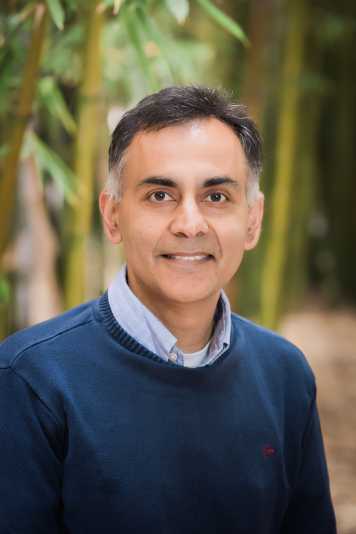Prelog Lecture 2018
Prof. Chaitan Khosla

Professor Chaitan Khosla, recipient of the 2018 Prelog Medal, Professor Chaitan Khosla, is the Wells H. Rauser and Harold M. Petiprin Professor of Chemical Engineering and Chemistry at Stanford University. After earning his B. Tech. in Chemical Engineering from the Indian Institute of Technology Bombay in 1985, he transferred to the California Institute of Technology for doctoral studies with Jay Bailey, receiving a Ph.D. in 1990. Following postdoctoral studies at the John Innes Centre with David Hopwood, he began his academic career as an Assistant Professor at Stanford in 1992, where he has remained since.
Professor Khosla's research lies at the interface of protein chemistry and medicine. Over the past two decades he has studied polyketide synthases as paradigms for modular, assembly-line catalysis. Pathbreaking findings have afforded new tools for understanding and manipulating biosynthetic processes toward diverse natural as well as nonnatural products ranging from antibiotics to biofuels. His methods are also decoding the vast, growing number of orphan polyketide assembly lines in sequence databases. The vibrant area of research known as combinatorial biosynthesis is attributable in large part to his pioneering studies of molecular machines that stitch together chemical building blocks to generate structural diversity. Efforts to engineer nonribosomally synthesized macrocyclic peptides, an exciting new class of drug targets with molecular weights between those of small molecule drugs and antibodies, have benefited directly from the strategies developed by Professor Khosla and his colleagues for polyketide enzymes.
The molecular basis for celiac sprue, an autoimmune disease of the small intestine, represents a second major research focus for Professor Khosla. A landmark in this area was identification of a 33-mer peptide as the primary initiator of the inflammatory response to gluten, in addition to its interaction with transglutaminase, member of a large family of enzymes that catalyze protein crosslinking. Therapies based on selective detoxification of this peptide are a long-range goal of this program. Such a broad scientific program illustrates how insights into enzymology and metabolism can be harnessed to improve human health, and reflect Professor Khosla’s open curiosity, indefatigable drive, and experimental prowess.
An accomplished scientist and communicator, Professor Khosla has authored over 350 scientific publications, holds more than 70 patents, and is widely recognized for his pioneering achievements. Among other major distinctions, he has received the Eli Lilly Award in Biological Chemistry (1999), the Alan T. Waterman Award from the National Science Foundation (1999), the American Chemical Society Pure Chemistry Award (2000), the Professional Progress Award from the American Institute of Chemical Engineers (2008), the Arthur C. Cope Scholar Award from the American Chemical Society (2009), and the James E. Bailey Award (2011). He is a member of the National Academy of Engineering and a fellow of the American Academy of Arts and Sciences, and co-founder of two biotechnology companies, Kosan Biosciences and Alvine Pharmaceuticals, as well as the non-profit Celiac Sprue Research Foundation.
Both in substance and in personal style, Chaitan Khosla epitomizes not only a scientific standard bearer but, more strikingly, a pacesetter. Distinctive technical breadth and broad intellectual qualities establish him as a thinker who moves forward in leaps rather than steps. The Laboratorium für Organische Chemie is honored to add the name Chaitan Khosla to those of distinguished Prelog medalists.